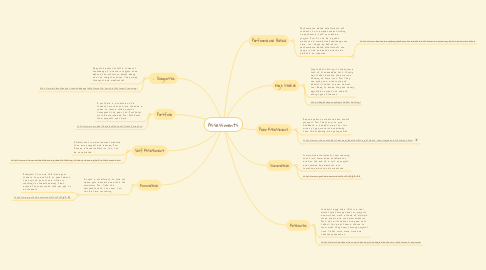Assessments
by Lydia Ramirez


1. Diagnostic
1.1. Diagnostic exams assess a students knowledge of a certain subject area before the instructor delves deeply into the subject matter. They weigh strengths and weaknesses.
1.2. http://www.teachthought.com/pedagogy/assessment/6-types-assessment-learning/
2. Formative
2.1. A check in assessment to find out where your learners are within the curriculum. Pro: Take the temperature of the room. Con: Can be time consuming.
2.1.1. Examples: Turn and talk: Have your student turn and talk to peers about the topic of your choice. Listen in checking for understandings. Float around the room make sure you get to all students
2.1.2. https://www.youtube.com/watch?v=rJxFXjfB_B4
3. Portfolio
3.1. A portfolio is a collection of a student's work over time. Created in order to show a child's growth throughout the year. Con: Portfolios must be maintained. Pro: Portfolios show progress over time.
3.2. http://www.unm.edu/~devalenz/handouts/portfolio.html
4. Self Assessment
4.1. Assessments in which learners measure their own progress and learning. Pro: Require internal reflection. Con: Can be very biased.
4.2. https://www.cte.cornell.edu/teaching-ideas/assessing-student-learning/self-assessment.html
5. Summative
5.1. Summative assessments show learning over time. Summative assessments are for the end of a unit or project and combine key elements into something which can be measured.
5.2. https://www.youtube.com/watch?v=rJxFXjfB_B4
6. Performance Based
6.1. Performance based assessments ask students to use higher order thinking to perform a task or create a project. Pro: It can be a great measure of cumulative knowledge over time. Con: Vague by definition performance based assessments can range in size and detail and can be difficult to measure.
6.1.1. https://www.edutopia.org/blog/performance-based-assessment-reviewing-basics-patricia-hilliard
